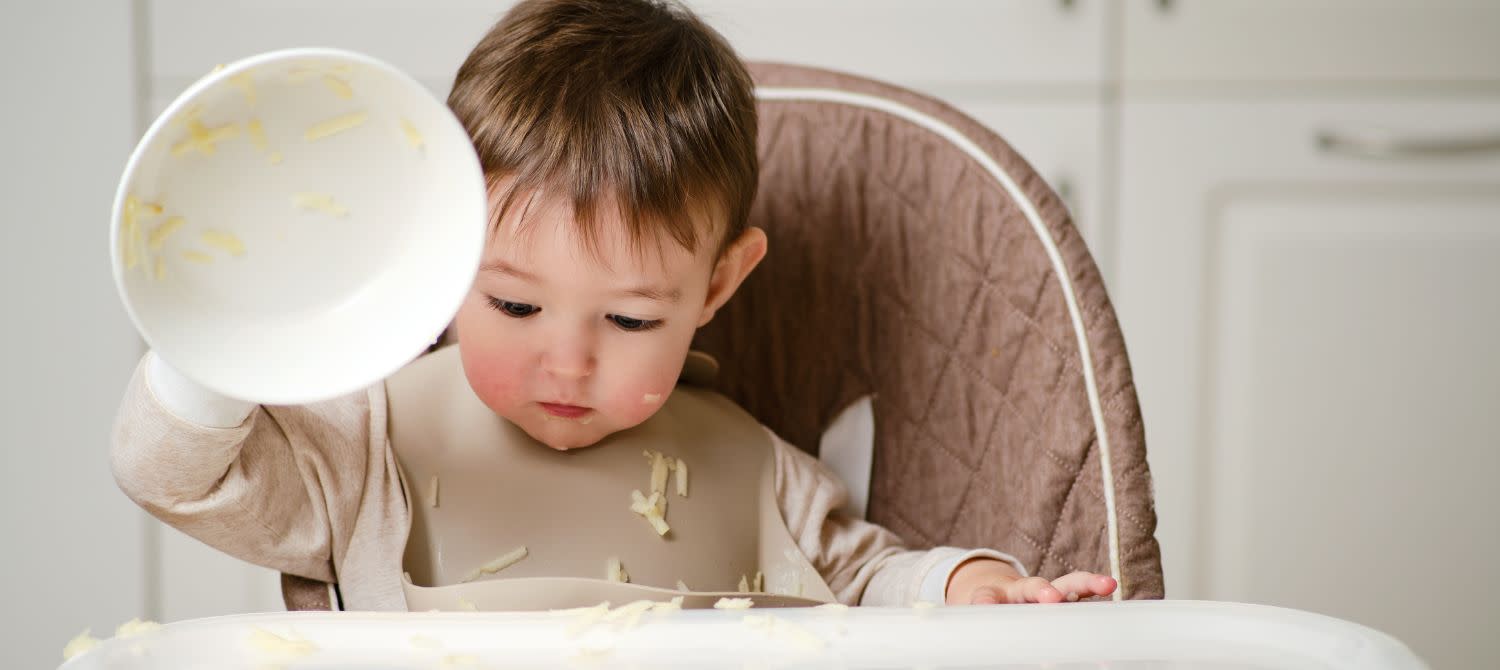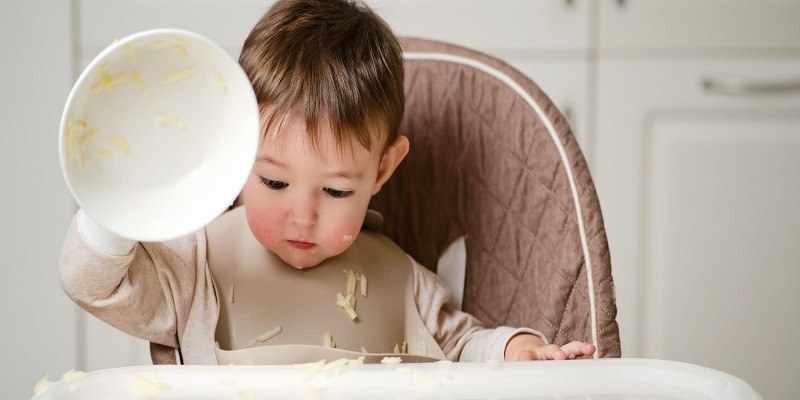To stop a toddler from throwing food, immediately remove the plate and avoid giving second chances or counting. It’s important to provide alternative behaviors for the toddler instead of focusing on the unwanted behavior.
Reinforce positive behavior by sitting with the child during meals, engaging in conversation, and paying attention to their preferences and eating habits. Avoid showing strong emotions and remain calm when the toddler throws food. By creating a positive mealtime environment and addressing the underlying reasons for the behavior, parents can effectively curb this behavior.
The Behavior
Looking for ways to stop your toddler from throwing food? Instead of reacting to the behavior, try redirecting their attention to an alternative activity. Avoid getting angry or showing strong emotions, and sit with your child during meals to establish a positive eating environment.
Understanding why toddlers throw food can help parents address this common behavior more effectively. By gaining insights into their motivations, parents can find strategies to redirect their toddler’s behavior and minimize food throwing incidents at mealtime. In this article, we will delve into the questions regarding toddlers throwing food, such as if it is normal, why they do it, and when they typically stop.
Is It Normal For Toddlers To Throw Food?
Many parents wonder if their toddler’s food throwing behavior is normal. The answer is yes. Throwing food is a common behavior displayed by toddlers as they explore their independence and test boundaries. It is a way for them to assert control and communicate their preferences. While it may be frustrating, it is essential to remember that it is a typical part of their development.
Why Is My Toddler Throwing Food On The Floor?
Understanding the reasons behind your toddler’s food throwing can help you address the behavior more effectively. There could be several reasons why your toddler is throwing food:
- Seeking attention: Your child may throw food to get your attention. They might enjoy the reaction they receive from you.
- Testing boundaries: Throwing food can be a way for toddlers to test boundaries and see how you respond.
- Lack of interest: If your child loses interest in their meal, they may throw food as a signal that they are done eating.
- Wanting control: Toddlers are exploring their independence, and throwing food gives them a sense of control over their environment.
When Do Toddlers Stop Throwing Food?
The age at which toddlers stop throwing food varies from child to child. While there is no definitive age, most toddlers start to outgrow this behavior between the ages of 18 months and 2 years old. As they develop better communication skills and understand cause and effect, they are more likely to move away from food throwing. However, every child is different, and it is essential to be patient and consistent with your strategies.
By understanding the behavior, parents can implement strategies and techniques to reduce food throwing incidents. In the next section, we will explore effective ways to stop toddlers from throwing food and create a positive mealtime experience for the entire family.
Strategies To Prevent Food Throwing
Preventing food throwing in toddlers can be achieved by removing the plate immediately when food is thrown, avoiding power struggles, and offering alternative behaviors. It is also important to stay calm and not show strong emotions when dealing with this behavior.
Sit with the child during meals and pay attention to their likes and eating habits to prevent food throwing.
Set Clear Expectations and Consistent Consequences
One effective strategy to prevent toddler food throwing is to set clear expectations and enforce consistent consequences. Toddlers thrive on routine and understanding boundaries. By clearly explaining that throwing food is not acceptable and enforcing consequences consistently, you can help your child learn appropriate behavior. For instance, you can calmly and firmly say, “We don’t throw food. If you throw your food, the mealtime will be over, and your plate will be taken away.” This approach teaches your toddler that throwing food leads to the end of mealtime, decreasing their motivation to engage in this behavior. It’s important to remain consistent and not provide second chances or counting, as this may undermine the message being conveyed.
Create a Distraction or Alternative Activity
Another effective strategy to prevent food throwing is to create a distraction or provide an alternative activity. Often, toddlers throw food out of boredom or to seek attention. Engaging your child in a different activity can redirect their focus away from food throwing. For example, you can offer them a small toy or a colorful board book to keep them entertained during mealtime. By offering an appealing alternative, you can reduce the likelihood of food throwing as your child becomes engrossed in a different activity.
Use Positive Reinforcement and Rewards
Positive reinforcement and rewards can be powerful tools in stopping toddlers from throwing food. Praising your child for positive behavior during mealtime helps to reinforce their understanding of acceptable behavior. For instance, if your child successfully eats their meal without throwing food, provide enthusiastic verbal praise and offer small rewards like a sticker or a special treat. This positive reinforcement motivates your child to repeat the desired behavior in order to receive more praise and rewards. Remember to focus on praising and rewarding appropriate behavior rather than focusing solely on the negative behavior of food throwing.
Engage in Interactive Mealtime Activities
Making mealtime enjoyable and interactive can also deter food throwing. Toddlers are more likely to stay engaged in their meal when they’re actively participating. Create opportunities for your child to participate by involving them in meal preparation or offering them a choice of foods. You can also make mealtime interactive by encouraging conversation, singing songs, or playing gentle background music. This stimulating environment can keep your child’s attention focused on eating rather than throwing food.
Stopping a toddler from throwing food requires strategies that are both firm and positive. Setting clear expectations and enforcing consistent consequences, creating distractions or alternative activities, using positive reinforcement and rewards, and engaging in interactive mealtime activities can all help prevent food throwing. By implementing these strategies consistently, you can facilitate a positive eating experience for your toddler while minimizing food throwing incidents.
Handling Food Throwing Incidents
Food throwing can be a frustrating behavior that many toddlers go through. It can be messy, wasteful, and sometimes even dangerous. However, there are several strategies you can implement to stop your toddler from throwing food. One of the key aspects of handling these incidents is to stay calm and composed.
Stay Calm And Composed
When your toddler throws food, it’s important to remain calm and composed. Reacting with strong emotions like anger or frustration can escalate the situation further and potentially reinforce the behavior. Instead, take a deep breath, and remind yourself that this is a normal phase of development for toddlers.
Avoid Overreacting Or Showing Strong Emotions
Overreacting or showing strong emotions in response to food throwing can have unintended consequences. Toddlers might interpret it as a form of attention and continue the behavior to seek your reaction. Therefore, it’s crucial to avoid yelling, acting shocked, or showing strong emotions.
Redirect Their Behavior
When your toddler throws food, redirect their attention and behavior to something more appropriate. Offer them a toy or engage in a fun activity to distract them from throwing food. By focusing their attention on something else, you can help them understand that throwing food is not acceptable behavior.
Teach Them Proper Mealtime Manners
Teaching your toddler proper mealtime manners can help prevent food throwing incidents. Sit down with your child during meals and lead by example. Show them how to use utensils, eat without making a mess, and express their needs verbally instead of throwing food. Reinforce positive behavior by praising them when they demonstrate good manners at the table.
Implement Appropriate Consequences If Necessary
In some cases, you may need to implement appropriate consequences to discourage food throwing. This could include taking away their plate or ending the meal if they continue to throw food. However, it’s essential to ensure that the consequences are age-appropriate and consistent. By implementing consequences, you can teach your toddler that there are consequences for their actions and encourage them to make better choices.

Credit: huckleberrycare.com
Frequently Asked Questions On How To Stop Toddler From Throwing Food?
How Do I Get My 2 Year Old To Stop Throwing Food?
To stop your 2-year-old from throwing food, remove the plate immediately if they throw food. Be consistent, without giving second chances or counting. Avoid power struggles by feeding little bits and sitting them on a towel or floor. Provide alternative behaviors and stay calm, avoiding strong emotional reactions.
Is It Normal For Toddlers To Throw Food?
Yes, it is normal for toddlers to throw food. Redirect their behavior by providing alternative activities and avoiding reactions with strong emotions. Sit with your child during meals and engage in conversation. Offer small portions and remove the plate if throwing occurs.
For more tips, search online.
How Do You Discipline A Toddler For Throwing?
To discipline a toddler for throwing, immediately remove the plate and end mealtime without second chances or counting. Provide an alternative behavior they can do instead of throwing or dropping food. Stay calm and avoid yelling or showing strong emotions.
Sit with your child during meals and pay attention to their likes and eating habits.
At What Age Do Toddlers Stop Throwing Things?
Toddlers typically stop throwing things at around 3 to 4 years old.
Is It Normal For Toddlers To Throw Food?
It is normal for toddlers to throw food as they are exploring their environment and learning cause and effect.
How Do You Discipline A Toddler For Throwing?
Instead of punishment, redirect their behavior by giving them an alternative activity or toy to play with.
Conclusion
To put an end to your toddler’s food throwing habit, it’s important to implement effective strategies that promote positive behavior. Instead of reacting with strong emotions, offer your child alternative actions they can engage in instead of throwing food. Additionally, sitting with your child during mealtime, providing attention, and encouraging open communication can help establish a positive eating environment.
Remember, consistency is key, and with patience and persistence, you can help your toddler overcome this challenging phase.
Last Updated on January 15, 2025 by Marjorie R. Rogers, MA (English), Certified Consultant

